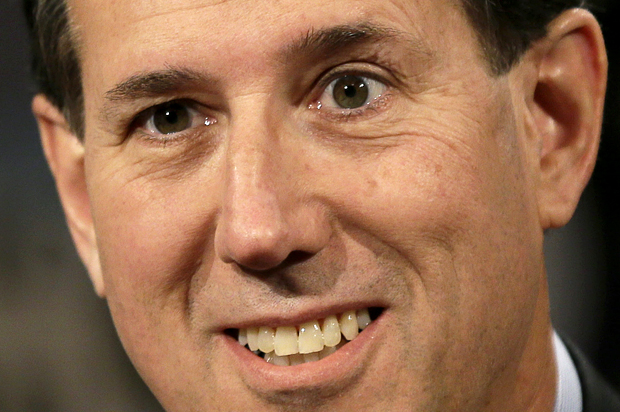Rick Santorum, Iraq truther: WMD die-hard claims
Rick Santorum will take credit for being right about Iraq's WMDs -- even if George W. Bush won't
A week ago, I introduced you to the
Iraq War Truthers: the conservatives who are so convinced that the Bush administration’s claims about Saddam Hussein’s weapons of mass destruction were correct that not even George W. Bush himself can persuade them that he was wrong. Their ranks include talk radio shouter Mark Levin and frequent Facebook user Sarah Palin, and they’re both operating under the theory that the evidence vindicating Bush’s pre-war WMD claims was covered up – for unknown reasons – by Bush.
Now the theory is getting a little bit of love from a presumed 2016 presidential candidate. Rick Santorum, who’s been pushing this bogus theory of Iraq WMD vindication for more than eight years now, co-wrote an Op-Ed for the Daily Beast (with Rep. Pete Hoekstra) on “
George W. Bush’s Puzzling WMD Coverup.”
Jumping off from a New York Times
report on the U.S. and Iraqi soldiers who were injured when they came into contact with the dilapidated remnants of Hussein’s chemical weapons program, Santorum and Hoekstra lay out their premise:
The entire world was understandably focused on finding chemical and biological forensics after toppling Saddam Hussein in 2003, as it was a top argument for the operation. Yet investigations supposedly uncovered no evidence of older weapons or an active program.
We now know with more certainty that at least one of those conclusions was wrong. Media reports from various sources indicate that vast quantities of old stocks of WMD were scattered throughout the country and endangering members of the U.S. military.
The idea that investigators somehow missed or didn’t report on the old chemical weapons found in Iraq is flagrantly untrue. The Iraq Survey Group (ISG), which went looking for chemical weapons in Iraq shortly after the 2003 invasion, said in its
2004 final report that “a small number of old, abandoned chemical munitions have been discovered” in the country. A 2005
addendumto the report has an entire section on “Residual Pre-1991 [Chemical and Biological Weapons] Stocks in Iraq” that listed some of the “vintage chemical rounds” that had been discovered by coalition forces. It concluded that “Iraq and Coalition Forces will continue to discover small numbers of degraded chemical weapons.”
The following year, the Senate
released its report on the pre-war Iraq intelligence and laid out the post-war findings regarding Iraq’s chemical weapons. It endorsed the ISG’s conclusions that older, unusable weapons had been discovered and also noted that “the National Ground Intelligence Center (NGIC) published a report which noted that coalition forces have recovered another 500 filled and unfilled degraded pre-1991 Gulf War chemical munitions since the ISG completed its work.”
Having misstated what weapons investigators concluded regarding Iraq’s degraded chemical weapons stockpiles, Santorum and Hoekstra push on through with the cover-up allegations:
It isn’t exactly news to those of us who had been investigating the issue. Nearly a decade ago, a declassified Pentagon intelligence report determined that coalition forces had recovered some 500 munitions containing degraded mustard or sarin nerve agents. In reality we now know that the numbers of munitions was actually much higher.
But for reasons we may never fully know, elements of the Bush White House did not want to acknowledge their existence. They were engaged in a forceful and effective campaign to keep this information from Congress, the press and the American people.
Again, the presence of older weapons was a matter of public knowledge as early as 2004, when the Iraq Survey Group report was released. The likely reason why the Bush administration didn’t want to publicly disclose each discovery of chemical munitions was that corroded and unusable chemical artillery shells in no way justified their apocalyptic pre-war rhetoric about Saddam’s chemical weapons capabilities.
But Santorum views it differently. He thinks the weapons vindicate Bush – or at the very least, they vindicate Rick Santorum. In 2006, as he was staring down the end of his Senate career, Hoekstra and Santorum called a press conference announcing “we have found weapons of mass destruction in Iraq,” referring to the 500 degraded mustard and sarin munitions. Asked on Fox News to respond to people who said those weren’t the weapons we invaded Iraq over, Santorum said that
they were proof that he, Rick Santorum, got it right on Iraq: “I can tell you I voted because I was concerned about Saddam having destroyed the chemical weapons that he said he destroyed … the fact of the matter is he hid them, the fact of the matter is we’re still finding them, and that this is a continuing threat.”
But that’s not what the Bush administration thought. That’s not what the intelligence community thought. And that’s not what the New York Times reported. Indeed, the scandal laid bare by the Times’ reporting isn’t that the Bush administration refused to acknowledge that old chemical weapons were found in Iraq; it’s that U.S. soldiers were wounded attempting to dispose of these weapons and the Bush administration covered that up.
But that’s not what has Rick Santorum upset. He’s more concerned that the administration isn’t as eager as he is to claim a foreign policy vindication they haven’t earned.


No comments:
Post a Comment